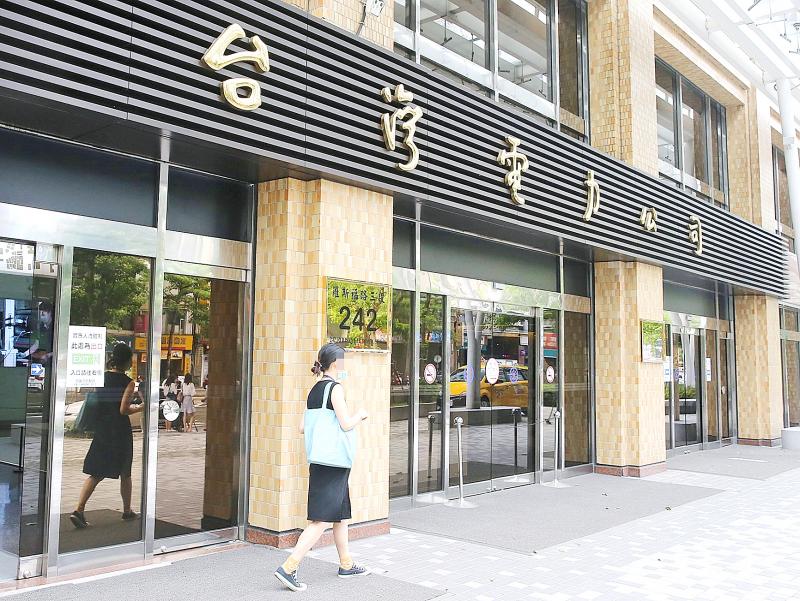From Wednesday next week, owners of electric vehicles would be charged NT$262.50 per month for household electricity use in addition to varying electricity surcharges, state-run Taiwan Power Co (Taipower, 台電) said on Sunday.
Taipower said the new rates aim to encourage vehicle charging during off-peak hours.
They would apply to the nation’s about 10,000 electric vehicle owners at their registered residence, as well as public charging stations, the utility said.

Photo: CNA
In addition to the monthly fee, electric vehicle owners would be charged a surcharge of NT$34.6 per kilowatt-hour (KWh) from October to May and NT$47.2 per KWh from June to September.
Taipower said it would also impose variable demand surcharges on electric-vehicle owners to ease the strain on the nation’s power grid.
From October to May, electric-vehicle owners would be charged an extra NT$8.13 per KWh between 3pm and 9pm, with the surcharge falling to NT$1.95 per KWh outside of those hours.
During the high energy consumption period from June to September, the surcharges would increase to NT$8.35 per KWh between 4pm and 10pm, and NT$2.05 per KWh outside of those hours, Taipower said.
The company said it hopes the new rates would encourage electric-vehicle owners to charge their vehicles outside of peak hours.
The new rates, which have been approved by the Ministry of Economic Affairs, would be officially announced tomorrow and take effect on Wednesday next week, the company added.
The company said it introduced the new rates in light of a considerable increase in sales of electric vehicles in Taiwan and a subsequent increase in demand for electricity.

NATIONAL SECURITY THREAT: An official said that Guan Guan’s comments had gone beyond the threshold of free speech, as she advocated for the destruction of the ROC China-born media influencer Guan Guan’s (關關) residency permit has been revoked for repeatedly posting pro-China content that threatens national security, the National Immigration Agency said yesterday. Guan Guan has said many controversial things in her videos posted to Douyin (抖音), including “the red flag will soon be painted all over Taiwan” and “Taiwan is an inseparable part of China,” while expressing hope for expedited “reunification.” The agency received multiple reports alleging that Guan Guan had advocated for armed reunification last year. After investigating, the agency last month issued a notice requiring her to appear and account for her actions. Guan Guan appeared as required,

A Vietnamese migrant worker yesterday won NT$12 million (US$379,627) on a Lunar New Year scratch card in Kaohsiung as part of Taiwan Lottery Co’s (台灣彩券) “NT$12 Million Grand Fortune” (1200萬大吉利) game. The man was the first top-prize winner of the new game launched on Jan. 6 to mark the Lunar New Year. Three Vietnamese migrant workers visited a Taiwan Lottery shop on Xinyue Street in Kaohsiung’s Gangshan District (崗山), a store representative said. The player bought multiple tickets and, after winning nothing, held the final lottery ticket in one hand and rubbed the store’s statue of the Maitreya Buddha’s belly with the other,

‘NATO-PLUS’: ‘Our strategic partners in the Indo-Pacific are facing increasing aggression by the Chinese Communist Party,’ US Representative Rob Wittman said The US House of Representatives on Monday released its version of the Consolidated Appropriations Act, which includes US$1.15 billion to support security cooperation with Taiwan. The omnibus act, covering US$1.2 trillion of spending, allocates US$1 billion for the Taiwan Security Cooperation Initiative, as well as US$150 million for the replacement of defense articles and reimbursement of defense services provided to Taiwan. The fund allocations were based on the US National Defense Authorization Act for fiscal 2026 that was passed by the US Congress last month and authorized up to US$1 billion to the US Defense Security Cooperation Agency in support of the

DAREDEVIL: Honnold said it had always been a dream of his to climb Taipei 101, while a Netflix producer said the skyscraper was ‘a real icon of this country’ US climber Alex Honnold yesterday took on Taiwan’s tallest building, becoming the first person to scale Taipei 101 without a rope, harness or safety net. Hundreds of spectators gathered at the base of the 101-story skyscraper to watch Honnold, 40, embark on his daredevil feat, which was also broadcast live on Netflix. Dressed in a red T-shirt and yellow custom-made climbing shoes, Honnold swiftly moved up the southeast face of the glass and steel building. At one point, he stepped onto a platform midway up to wave down at fans and onlookers who were taking photos. People watching from inside